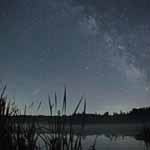Arboretum Workshop Descriptions
The Arboretum offers adult and family appropriate workshops on a variety of topics. Please consult our workshops page for currently running workshops.
Arts and Photography
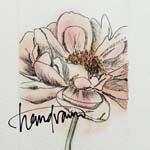
Greeting Spring: Making Your Own Greeting Cards
This workshop for both novice and experienced painters covers the basic techniques and tools necessary to create your own greeting card using watercolours and simple calligraphy. Materials are provided, but participants are also welcome to bring their own.
*Maximum 20 adults when held in person.
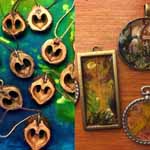
Jewellery Making with Natural Materials
In this workshop participants learn to create something beautiful with treasures found on the forest floor! All materials and tools will be provided, and everyone will leave with at least two pieces. A great family activity. Children 9+ years old are welcome to register with a registered adult.
A great family activity. Children 9+ years old are welcome to register with a registered adult.
*Maximum 20 participants when held in person.
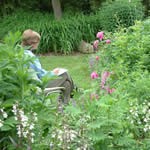
Sketching Nature
Focusing on sketching techniques and note-taking, this workshop is designed for beginners who want a permanent record of their observations of nature.
*Maximum 20 adults when held in person.
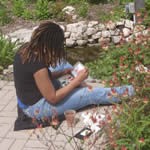
Look, See, Paint
This program is designed for beginners to discover the natural world and the fun of watercolour painting. Those with experience are welcome to join, too. .
*Maximum 10 participants when held in person.

Smartphone Photography: Who Needs A Camera Anyway?
This workshop seeks to open the door to the world of photography that can be achieved simply through a mobile phone. Timed to take place during the golden hour on a spring evening, participants will learn some basic concepts and skills using their own mobile devices. iPhone or Android, beginner or expert, all are invited to come take some photos.
*Maximum 18 adults when held in person.
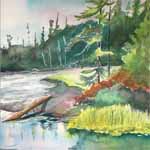
Introduction to Watercolour Painting
This fun 4-week class focuses on the Canadian landscape. Participants learn a variety of techniques to help them build confidence painting in watercolour, learn about colour theory, and develop their own personal style. No experience necessary. After registration participants receive a list of supplies to bring with them to the workshop.
*Maximum 20 adults when held in person.

Watercolour Plein Air Workshop
Learn how to capture the Canadian landscape outdoors or en plein air like the Group of Seven using watercolour paint. Workshops cover supplies needed, set up, techniques, and how to finish a painting quickly and accurately with changing light. After registration, participants receive a list of supplies to bring with them to the workshop.
*Maximum 20 adults when held in person.
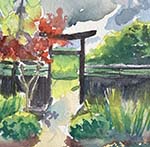
Spring Landscape Watercolour Painting
Participants will learn several techniques in watercolour and put them together to create lovely spring landscapes. Beginner and intermediate classes are offered.
*Maximum 20 adults when held in person.

Winter Landscape Watercolour Painting
Winter landscapes do not have to be bleak and boring. This workshop explores a variety of ways to paint glistening snow and ice, and participants learn how to paint expressive and vibrant winter landscapes in watercolour.
*Maximum 20 adults when held in person.

Snow in Watercolour
In this beginner friendly workshop, Candice will demonstrate a variety of techniques to capture snowy landscapes in watercolour. During the second half of the class, she will work with students step by step to create a simple snowy winter scene.
A supply list is provided upon in your confirmation. Please ensure you have the supplies on hand for the workshop.
Fee: $30 (plus HST) per person.

Painting Trees in Watercolour at The Arboretum - All Levels
Join watercolour artist Candice Leyland and learn to capture trees in watercolour. Perfect for those wanting to improve their landscape painting or anyone that is drawn to painting trees and greenery. In this class participants will learn a variety of techniques to create different types of trees throughout the seasons including birch trees, evergreen trees, and lush foliage.
This class is great for a variety of levels.
Reference photos will be provided.
Supplies:
- Watercolours - a variety of colours - artist grade watercolour is best
- Watercolour paper - I prefer Arches 140 lb cold press paper. Make sure you have a good quality paper.
- A variety of watercolour brushes (I love a 2 6, and 8 Round Brush.
- Optional: a small fine tip brush (a “liner", “rigger” or a small brush will be helpful for branches and small details).
- Painters tape or washi tape
- Board to tape paper to
- Watercup and paper towel
- Pencil
Fee:$30 (plus HST) per person.
Astronomy
Planetarium sessions are live and interactive. Families are welcome. Registrants under age 16 must be accompanied by an adult. Participants are encouraged to bring questions to ask during the workshops. *In person workshops have a maximum capacity of 25 participants.
The planetarium dome is 5 meters in diameter. This small, intimate space requires most participants to be seated on the floor during presentations. Foam floor cushions are provided. The dome is wheelchair accessible. In addition, chair seating can be accommodated for up to 3 guests, if requested in advance.
Check out this video of a past Planetarium Workshop with guest instructor Trevor Chandler.
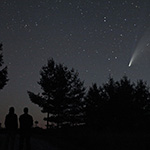
Getting Into Astronomy
Astronomy Foundations is an online course designed to introduce and orient astronomy enthusiasts to the night sky. Over the 12 sessions, a wide range of topics are covered, from understanding our place in space, finding our way in the sky, and understanding a little more of the wide variety of astronomical objects that await your discovery. Each session focuses on a specific astronomical topic in detail. These topics will include why the sky looks and moves as it does, the nature of planets and other solar system bodies, where stars come from, how they evolve and where they’re going, and how astronomers have learned what they are and how they have estimated their staggering distances. Clusters of stars small and large as well as the great “Star Cities” - the galaxies, such as our own Milky Way will be covered. Throughout the sessions there will be reviews on how to use the star maps to find some of the best and brightest of the night sky’s offerings for yourself.
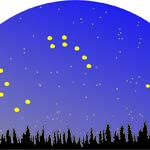
Planetarium ... What's Up Tonight?
Planets are always on the move, as are we! This planetarium program series explores the planets, stars, and constellations that are visible in the night sky each month. Participants learn how to orient themselves in the sky to find the Big Dipper and how it can be used to find North. Every workshop explores at least one constellation or planet and its mythology, the brighter stars in the sky and their names, lore and meaning, as well as a few of the astronomical objects located within the boundaries of the featured constellation. If weather conditions permit, participants may be invited outside under the stars to see the real deal through a telescope.
- January features the planets Mercury and Orion.
- February features the planets Venus and Taurus.
- March features the planets Uranus and Gemini.
- April features the planet Gemini and Earth's Moon.
- May features the planets Leo and Neptune.
- June features the planets Virgo and Mercury.
- July features the constellation Hercules.
- August features the planet Mars.
- October features the planet Saturn, minor planet Pluto, and the Constellation Cygnus.
- November features the planets Uranus and Neptune, and the Constellation Cassiopeia.

Planetarium ... Moons of the Solar System
There are currently eight planets in our solar system. Orbiting many of these planets are a wide variety of moons, each one of them with its own unique story to tell. This program explores some of the differences between planets and moons and will introduce some of the major moons of our solar system. Participants learn the definitions for celestial bodies like, “star”, “planet”, moon”, and “orbit” and the associated sizes, distances, and scales. How the motions of the Earth, Sun and our Moon and cause the Earth’s moon cycles through phases will also be covered. The first 30 minutes of the program is spent outside of the dome working with physical models of the Earth, Sun, and Moon to help understand what we see in the sky.

Planetarium ... All About Mars
This program provides an opportunity to explore the some of the basic scientific facts that have been discovered about one of our closest space neighbors - Mars. Mars appears to have once been a lot like Earth, with oceans and a dense atmosphere, but then it all went horribly wrong. Much of what we have learned about Mars has come from robotic missions that seem to give rise to as many questions as are answered. This workshop also includes a review of astronomy terms such as “planet” and “orbit”. Participants learn about the physical characteristics of Mars and how to recognize Mars and other planets in the night sky.

Planetarium ... The Sky Tonight... featuring Hercules
The Constellation Hercules - the champion - is prominently positioned in the mid-summer sky. This region of the sky also happens to be the direction toward which our solar system is heading as it makes its long circuit around the center of the Milky Way once every 250 million years or so. Although it is the 5th largest of the 88 constellations, Hercules does not contain many bright stars, but it abounds with objects that are visible even with a small telescope. Perhaps its most beautiful feature is the Great Hercules Star Cluster, a swarm of about one million bluish suns.
This workshop also includes a review of astronomy terms such as “planet” and “orbit”. Participants learn how to recognize the Constellation Hercules and other celestial objects in the night sky.
Birds
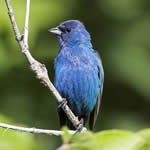
The Art of Birding - An Introduction to Your New Passion
This workshop is for those who don't know where to start but want to become a bird watcher. Over lunch participants watch Arboretum birds and study their behaviour. Topics from identifying birds to choosing and using binoculars, basic ornithology by studying anatomy, breeding biology, classification, and habitat requirements will be covered. Participants are encouraged to bring a lunch, plus a bird book and binoculars, if possible.
*Maximum 18 adults when held in person.
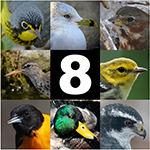
Bird ID Series
Birding has become an even more popular hobby now that more people are home and enjoying nature. Why not take it to the next level? This workshop series includes eight noon-hour lectures on eight different bird groups: hawks, ducks, sparrows, sandpipes, gulls, spring warblers, fall warblers, and spring migrants. ID techniques, field marks, shapes, behaviour clues, and more will be covered. Each workshop includes a 10-15 minute discussion period for bird-related questions.
Fee: $8 (plus HST) per person, per session or book all 8 and get one free ($56 instead of $64).
 Week 1 - Hawks
Week 1 - Hawks
Everyone loves raptors but they can be a bit challenging as they fly by overhead. We will be covering what to look for to ID our 16 regular species. A special emphasis will be learning how to tell Cooper's Hawks from Sharp-shinned Hawks as they are common backyard predators that can be confusing! $8.00 (plus tax) per session or register for all 8 for $56.00 (plus tax)
 Week 2 - Ducks
Week 2 - Ducks
This colourful group of waterfowl is full of interesting shapes, patterns and lifestyles. And, while the males are usually pretty straightforward to identify, the females can be quite challenging! We will dabble with dabblers and dive into divers in this web-footed workshop. $8.00 (plus tax) per session or register for all 8 for $56.00 (plus tax)
 Week 3 - Sparrows
Week 3 - Sparrows
"Uh oh, a sparrow!" If this statement has ever left your lips, then this talk is for you! They may seem drab and dull at first, but these LBJs (little brown jobs) really aren't that hard once you know what to look for. And since there are different species depending on the season, they are really worth knowing! $8.00 (plus tax) per session or register for all 8 for $56.00 (plus tax)
 Week 4 - Sandpipers
Week 4 - Sandpipers
There's nothing like looking at a bird that is standing right out in the open and still not being able to identify it. Sandpipers definitely fall into this category. We will cover beak and body shape, leg and neck length, colour placement and behaviour so you will have a better chance to id that shorebird the next time you see it. $8.00 (plus tax) per session or register for all 8 for $56.00 (plus tax)
 Week 5 - Gulls
Week 5 - Gulls
Did you know that southern Ontario (and specifically the Niagara River) is often considered the Gull Capital of the World? In late fall/early winter, we can find many species of gull in this region, so it is time to get to know our french fry-loving friends. We will focus on adults but also cover some immature stages to try and get a handle on this interesting group of birds. $8.00 (plus tax) per session or register for all 8 for $56.00 (plus tax)
 Week 6 - Spring Warblers
Week 6 - Spring Warblers
Mention the words "spring warblers" to birders in the depths of February and you'll see longing, wistful looks on their faces. That's because spring warblers rock! And southern Ontario in spring is an amazing place to see over 30 species of these colourful little rays of sunshine. But this abundance of species does mean a lot to remember, so we will be covering ways to help with that. $8.00 (plus tax) per session or register for all 8 for $56.00 (plus tax)
 Week 7 - Fall Warblers
Week 7 - Fall Warblers
While "spring warblers" will bring a smile to a birder's face, "fall warblers" might turn that smile upside down. This bird group is especially tricky during their fall migration when some species transform miraculously into seemingly different birds altogether! But don't worry, we will get them sorted out. $8.00 (plus tax) per session or register for all 8 for $56.00 (plus tax)
 Week 8 - Spring Migrants
Week 8 - Spring Migrants
This hodge podge of bird groups makes May migration a special time for nature lovers. We will cover some easy to id species (male Baltimore Oriole!) and some not-so-easy ones (ack, a little greenish flycatcher!) to help you be prepared for next spring. $8.00 (plus tax) per session or register for all 8 for $56.00 (plus tax)
Fee: $8 (plus HST) per person, per session or book all 8 and get one free ($56 instead of $64).

Virtual Bird Song Series
Into birding but songs have you stumped? Join Chris Earley, Arboretum Interpretive Biologist and author of 5 bird field guides, for a series of eight virtual noon-hour lectures to cover over 150 bird species! We will focus on songs and some common, distinctive calls and will apply different methods to remember them. Each course will start with a short intro topic about birding by ear before we dive into the bird species. Learn how to make your own calls, read a sonogram, make up your own memorable bird song sayings and more! We will finish each class with a 10-15 minute discussion period so you can ask all your bird-related questions. The course is suitable for those new to learning bird sounds as well as the more experienced.
You can sign up for individual courses for $8 (plus tax) each or take all eight at the discounted cost of $56 (plus tax - that's eight courses for the price of seven!). See below to find out what bird groups are covered in each class. And don't worry - if you miss one or this time doesn't work for you, you will be sent recorded programs afterwards and will have access to them for a month after the whole series. For those that take the whole course, we will also be making the videos available again for a couple of weeks in April so you can review them just before the peak of spring singing occurs!
Fee: $8 (plus HST) per person, per session or book all 8 in one transaction and get one free ($56 plus HST instead of $64 plus HST).
 Day 1 - Owls and Wetland Birds
Day 1 - Owls and Wetland BirdsWhooooooo was that? Owls always grab our nightly attention but many wetland birds are also evening singers. We will cover a selection of rails, coots, bitterns, loons, grebes and more. And don't forget a couple of glorious goatsuckers (whip-poor-wills and nighthawks)! This course will include teaching you how to speak "owl." $8.00 (plus tax) per session or register for all 8 for $56.00 (plus tax)
 Day 2 - Blackbirds and Hawks
Day 2 - Blackbirds and Hawks
These two groups include some early migrants and now is the time we get to see them after a long absence! We will cover the whole blackbird family including meadowlarks, bobolinks and orioles. We will also study some raptor calls so you can figure out who might be flying through or maybe nesting in your local forest. $8.00 (plus tax) per session or register for all 8 for $56.00 (plus tax)
 Day 3 - Phrasers and Buzzers
Day 3 - Phrasers and Buzzers
Knowing warbler song is a key element for finding these tiny trinkets of the treetops. The males will even sing during migration so knowing their voices is important. In this course we will start with the species that sing distinctive phrases or use a buzzy texture in their songs. $8.00 (plus tax) per session or register for all 8 for $56.00 (plus tax)
 Day 4 - Trillers and Thrillers
Day 4 - Trillers and Thrillers
So, this time things might be a bit more, um, difficult. Trilling birds are tricky but we will go through them and study the differences in these similar songs. We will also cover some other warblers that are a bit more musical and easier to figure out! $8.00 (plus tax) per session or register for all 8 for $56.00 (plus tax)
 Day 5 - Sparrows
Day 5 - Sparrows
They may be a lot duller to look at than warblers but most sparrows are much better singers! Sometimes it is easier to tell them apart by song than by sight. We will study who says "Home Sweet, Canada, Canada, Canada", "I gotta go wee wee now!" and "Won't you come sit down besiiiiiide meeeee?" $8.00 (plus tax) per session or register for all 8 for $56.00 (plus tax)
 Day 6 - Finches and Thrushes
Day 6 - Finches and Thrushes
Finches, including grosbeaks, redpolls and crossbills, can be sparrow-like but are even better songsters. But some of them sound the same so we will figure out ways to tell them apart. Their call notes can be important during bird surveys so we will cover some of them, too. Thrushes have lovely voices and one was once voted as the best singing bird in North America! Find out which one at this workshop. $8.00 (plus tax) per session or register for all 8 for $56.00 (plus tax)
 Day 7 - Woodpeckers and Flycatchers
Day 7 - Woodpeckers and Flycatchers
Sometimes you have to know mechanical sounds to figure out a nearby territorial bird - woodpecker drumming is a prime example. They also make some distinctive calls. And speaking of distinctive, some flycatchers can only really be identified by their songs, not by sight! We will listen to these and get a handle on this confusing group. $8.00 (plus tax) per session or register for all 8 for $56.00 (plus tax)
 Day 8 - Wrens and Friends
Day 8 - Wrens and Friends
We will finish off with a hodge podge of species such as wrens, vireos, jays, nuthatches, kinglets and more! Many of these live in forest habitats and could all be singing or calling at the same time so learning to differentiate them is an important skill. Are you ready for the challenge? $8.00 (plus tax) per session or register for all 8 for $56.00 (plus tax)
Fee: $8 (plus HST) per person, per session or book all 8 and get one free ($56 instead of $64).
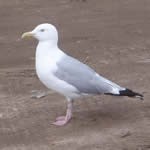
Gull workshop: Graceful, Gregarious & Simply Gorgeous
This workshop has been designed to help you develop your skills in the identification of wintering gulls. Through a variety of hands-on activities participants will learn about gull plumage, size differences, bill shapes, and behaviours of 13 different gull species. Where to the best places to watch gulls are and how some gull species have adapted to the urban environment are also covered.
*Maximum 18 adults when held in person.
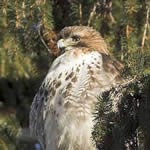
Hawks: Those Magnificent Raptors
This workshop has been designed to help you develop your skills in identifying migrating hawks, falcons, vultures, eagles, and osprey. Through a wide variety of hands-on activities participants will learn about plumage, body shape, foraging techniques, flight patterns, and the migration times of 15 species. An information booklet is provided.
*Maximum 18 adults when held in person..
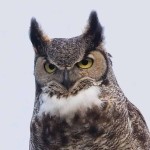
Owls: A Who's Whoo in Ontario
Discover how to use your eyes and ears to identify Ontario's Owls. Through a wide variety of hands-on activities participants will learn about owl plumage, calls and behaviour, habitat requirements, migration patterns, and owl folklore.
Check out this video of a past Owl Workshop.
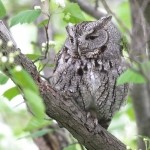
Night Stalker's Owl Prowl (adults only)
Learn about the behaviour and adaptations of owls in the Guelph area. The introduction to this program will take place indoors, but participants are encouraged to dress warmly in preparation for a walk outdoors at night. This program is for adults and teens aged 14+.
*Maximum 25 people when held in person.
Watch this video about the Owl Prowl to learn more.

Night Stalker's Owl Prowl (family night)
Learn about the behaviour and adaptations of owls in the Guelph area. The introduction to this program will take place indoors, but participants are encouraged to dress warmly in preparation for a walk outdoors at night. This program is for adults and children under 14.
*Maximum 25 participants when held in person.
Watch this video about the Owl Prowl to learn more.
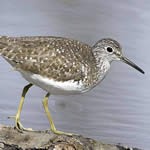
Shorebirds
A workshop on one of the most difficult groups of birds to identify. Using plumage, shape, size, calls, and behaviour, participants learn to identify and distinguish sandpipers, plovers, phalaropes, turnstones, knots, godwits, and whimbrels. If you are up for the challenge, this is the workshop for you!
*Maximum 18 adults when held in person.
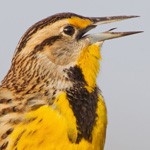
Bird Sounds
This workshop begins with an early morning hike in The Arboretum to get you tuned into bird sounds. Participants learn how to develop their listening skills to identify that bird "way up there behind all those leaves." A variety of techniques will be used to help participants describe and remember the different songs and calls of birds such as flycatchers, vireos, thrushes, and woodpeckers.
*Maximum 18 adults when held in person.
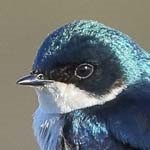
Songbird Families of Ontario
Songbirds, also known as the 'perching birds' or 'passerines', are by far the most diverse bird group accounting for 60% of known bird species on Earth. In this workshop, participants learn how to use shape and other key characteristics to simplify identifying songbirds. Learning how to ID different passerine families makes for exciting and interesting connections between different species and helps to build a story around a group of birds rather than memorizing individual species. This workshop series includes four lectures covering all of Ontario's songbird families including stories about the various survival strategies of this amazing group of birds. An optional guided walk to practice songbird family ID is also included.
*Maximum 40 adults when held in person.
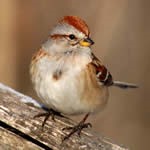
Sparrow Workshop: Those Little Brown Jobs
This workshop explores how to identify and study the 19 species of sparrows found in Ontario. Through hands-on activities, participants learn about the plumages, songs, and habitats of this difficult-to-identify group. This workshop takes place over lunch and includes a hike through The Arboretum looking for our resident sparrows. An information booklet will be provided.
*Maximum 18 adults when held in person.
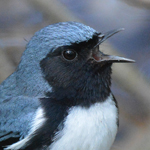
Warbler Workshop Level I: Butterflies of the Bird World
Through a wide variety of hands-on activities participants learn about the plumage, song and behaviour of warblers, and investigate warbler habitat requirements and the timing of their migration. An information booklet is provided.

Warbler Workshop Level II: The Less Common Ones
This workshop covers 15 less commonly seen southern Ontario warblers that are not covered in the Level I Warbler Workshop. Participants will receive an information booklet.

Warbler Tuneup
This workshop takes begins with a stroll through The Arboretum listening to and identifying the bird songs, after which participants spend time reviewing warbler songs and develop a method of remembering warbler songs.
*Maximum 18 adults when held in person.
Nature Discovery
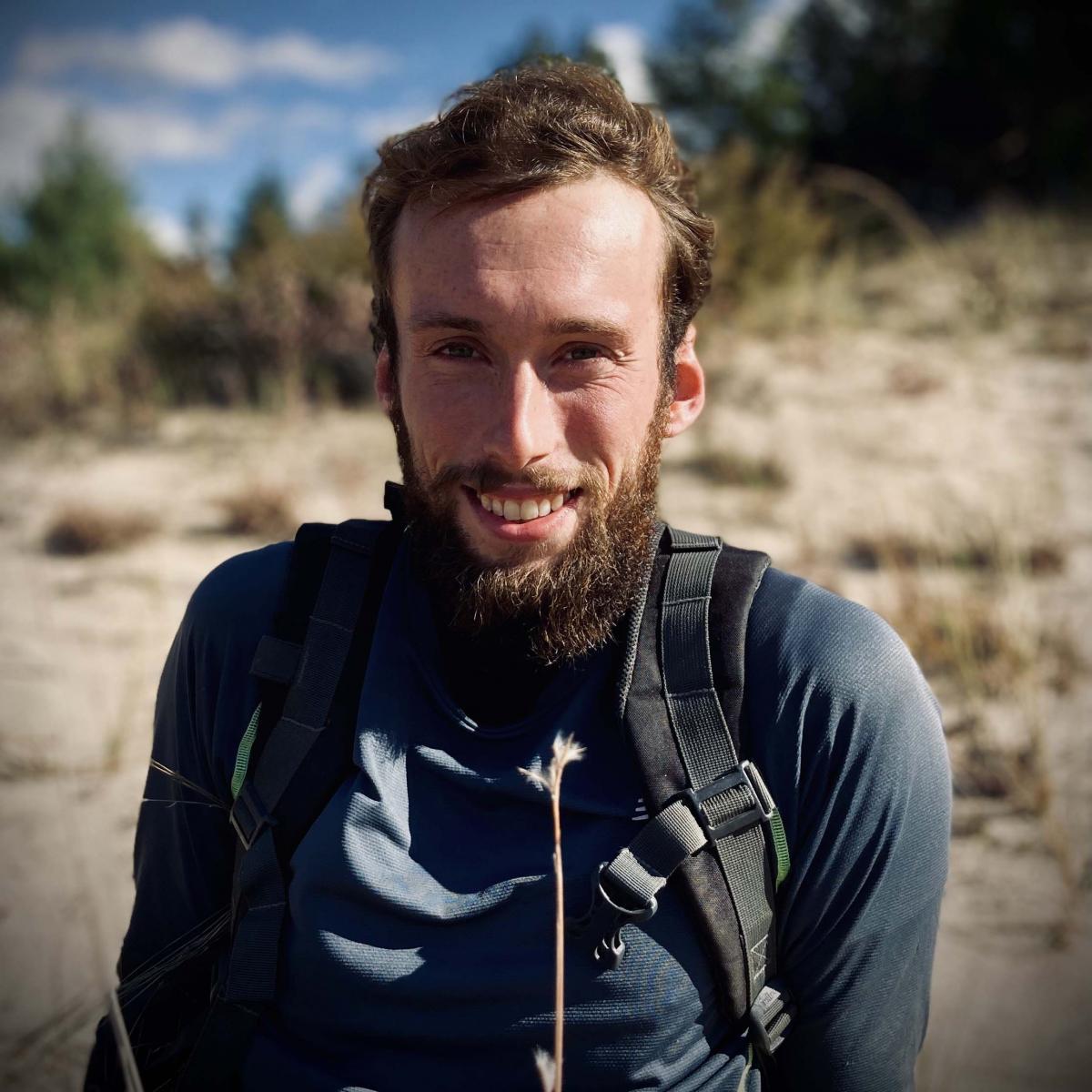
Ask The Gardener
Ask you garden related questions in this free one-hour live session (delivered on Zoom).
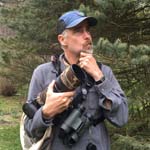
Ask the Naturalist
Ask your nature and wildlife related questions in a free one-hour live session (delivered on Zoom).
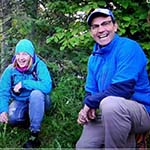
Tips for Heightening Your Winter Nature Walks
Participants will be guided through meaningful and fun invitations to ease them into full body senses with a Certified Forest Therapy Guide.

An Introduction to Anishinaabe Bimaadiziwin ‘Path/ Life' - Workshop 1 and Workshop 2
The following online workshops will offer an introduction to Anishinaabe culture, science, language, and knowledge. The Anishinabek are the Indigenous peoples of the Great Lakes region.
Workshop 1- Akinoomaagewin, A Brief Introduction to Anishinaabe Science and Education
In this workshop an explanation of what Anishinaabe science will be discussed, and how this is different from Western science. But by focusing on the strengths of each type of science, various scientific disciplines can be informed. The conversation will flow naturally into a discussion of Anishinaabe education.
Workshop 2- Mishkiki, The Strength of Mother Earth and our Relationships with Plants
In this workshop a discussion of what Medicine is will be fostered. The four sacred Anishinaabe medicines and how they can affect your body, mind, spirit, and emotions will be discussed. This discourse will lead to a conversation about Anishinaabe botanical knowledge.
Tracking
Learn more about our Introduction to Tracking Ontario Mammals Program
Who left that track in the snow? This introductory tracking workshop will help you identify differences in track patterns for some common mammals that live in Ontario.
Learn more about our Tracks, Signs and Scat Program
Animals can sometimes be tricky to see but they are always leaving stories about their lives for us to find. In this tracking workshop, we will look at tracks, scat and sign for a variety of Ontario mammals. By looking at these clues, we can piece together mysteries that bring us closer in our connection with the wild beings of the meadows, forest and shorelines.
Learn more about the Tracking workshop
Sunday, February 6, 2022, 9 AM - 12 NOON
Format: IN-PERSON
Instructor: Tamara Anderson
Mask (medical grade or higher), proof of vaccination and screening required to attend this event.
Come and learn about animal tracking in a hands-on workshop at the Guelph Arboretum. We will look for tracks, scat and signs for a variety of Ontario animals.
Dress in layers to be outdoors. Wear comfortable, warm boots. Recommended: Bring a notebook and a measuring tape to help with track identification.
Fee: $50 (plus HST) per person if booked before the early bird deadline of Saturday, January 29, 2022. After the early bird deadline the fee is $60 (plus HST).
Gardening and Horticulture
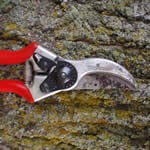
The Art & Practice of Pruning
This half-day indoor/outdoor practical workshop teaches the principles of easy and correct pruning in the home landscape. Participants learn how to choose the right equipment and how to keep it sharp and clean. Pruning techniques will be shown and practiced on a variety of shrubs and small trees.
**Maximum 16 adults when held in person.
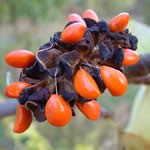
Growing Native Woody Plants from Seed
Diversity is the emphasis of this full-day course on how to grow your own native trees and shrubs. Characteristic seeds for the workshop will be collected while touring part of The Arboretum. Participants learn the techniques for cleaning, treating, and sowing seeds; and how to protect them as seeds and young plants. A tour of The Arboretum's native plant nursery is included.
*Maximum 16 adults when held in person.
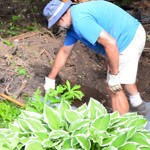
Gardening Fundamentals
Gardening Fundamentals is a series of courses designed for both the beginner and experienced gardener. Course material covers basic information to provide a good grounding and then goes on to introduce advanced topics that are normally not found in gardening books. Participants learn the fundamentals of gardening, how to plant and maintain the best garden on the block, and have an opportunity to have all of their gardening questions answered by local master gardeners.

Vegetable Gardening
We’ll cover the following topics:
• Creating a new bed and different systems; in the ground, raised beds and growing in containers
• Best soil selection and how to get it ready for the growing season
• When to use seed vs transplants, and starting early indoors
• Dealing with weeds and other gardening tricks
• Watering, sun and fertilizer – keep them growing for a maximum yield
• Harvesting and fall crops
• Common vegetables myths
Robert is a Master Gardener and garden writer who publishes two popular gardening blogs and has published several gardening books. He owns and operates a private botanical garden where he grows over 3,000 different varieties of plants.
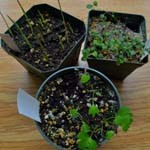
Plant Propagation
This full-day course introduces participants to the wonderful world of creating new plants. The morning session focuses on growing plants from seeds and include topics such as, collecting, cleaning, storing, dormancy, and stratification. Growing under lights in pots, winter sowing, and germination using the baggy method will also be discussed. The afternoon focuses on vegetative propagation including division, cuttings, layering, and budding. This course provides the foundation you need to propagate thousands of different plants, including perennials, shrubs, and trees.
*Maximum 20 adults when held in person.
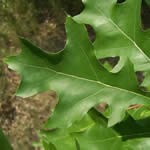
Tree Identification
This full-day program helps participants refine their skills to identify trees in Ontario. The focus of the workshop is on learning the important identification characteristics of difficult tree groups such as the cherry, oak and walnut families as well as the easier groups such as ash and maple. The afternoon is spent outside identifying trees in the forest as well as young cultivated trees with their Eurasian counterparts in the World of Trees collection. Participants are encouraged to bring their field guides and binoculars.
*Maximum 16 adults when held in person.
Shrub ID

Thursdays, September 9, 16, 23 and 30, 2021, 12 - 1 PM
Format: Online via Zoom
Instructor: Shelley Hunt
Ontario has dozens of native shrub species, from dogwoods to viburnums, blackberries to spicebush, and everything in between. Where to start in learning to identify them? In this workshop, spread over 4 zoom sessions, we will cover basic shrub morphology and learn the key ID features of a wide variety of these diverse woody plants. The 3rd session will include a virtual tour of shrubs in The Arboretum's collections.
Fee:$50 (plus HST) per person.
Virtual Winter Tree I.D.
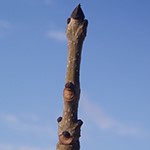
Format: Online via Zoom
Instructor: Shelley Hunt
Learn more the Virtual Tree ID Program
No leaves? No problem! In this workshop you will learn about the variety of tree features that are useful for winter identification of deciduous trees as well as evergreens. From buds and leaf scars to bark and needles, we will take an in-depth look at the surprisingly distinctive characteristics that let us unlock the identities of trees in their dormant season. We will focus on native Ontario tree species. Optional 'homework' assignments will encourage you to get outside and observe trees in between sessions. The program runs once a week for 4 weeks.
Fee: $50 (plus HST) per person for the 4 session program.
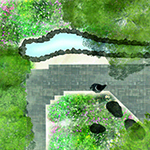
Wildlife Garden Design Course
Learn how to design a diverse garden space that attracts native wildlife species through key design elements, plant choices and maintenance needs. This course will draw from concepts found in The Arboretum’s Gosling Wildlife Gardens, while also offering insight on design features and plant species that have proven to be successful in our local Ontario setting. From attracting endangered pollinators to gardening with native plants, participants discover the relationships between plants and wildlife and how these ideas can be applied to a backyard!

Virtual Japanese Garden Design Course
Japanese gardens have been an inspiration for centuries, influencing the creation of new gardens and landscapes both in Japan and in the West. In this introductory course to Japanese garden design, you will learn about the traditional techniques used to establish gardens of peace and Zen. These gardens require a high attention to detail, involving various techniques in pruning and shaping plants, the importance of viewpoints, wood preservation methods, as well as the unique applications of water and stone and how they connect to each other within the garden to create this compositional balance and harmony. Wherever your interest lie, in theory or in practice, this course is intended to help you appreciate and understand this unique tradition.
Seed Rain: Recognizing and Collecting Native Plant Seeds

Sunday, September 12, 9 AM - Noon
Format: In Person
Instructor: Sean Fox and Sarah Farquharson
Diversity is the emphasis of this half-day workshop on ethical native plant seed collection. Participants will tour the incredible grounds of the Arboretum looking at hundreds of species of native trees, shrubs, wildflowers and ferns while gaining experience with seed forecasting and identification, effective harvesting techniques, and ecologically-responsible considerations to follow while collecting. Wear some comfortable shoes and prepare to be wowed by the incredible diversity of seed raining down upon us!
Fee: $65.00 - Early Bird Fee, $75 - after September 4
Insects, Mammals and More
Animal Tracking
In this full-day program participants learn how to track animals and study the tracks and signs of Ontario mammals and other types of wildlife in the snow. This workshop also includes an introduction to scat identification and an outdoor component of looking for and following animal tracks and trails. Each participant receives a copy of The Mammals of The Arboretum booklet that includes many tracks.
*Maximum 18 adults when held in person.Watch this teaser video about our Winter Animal Tracking workshops.
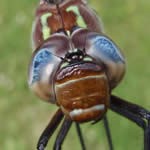
Dragonflies and Damselflies
Ontario is home to over 150 species of Odonata (dragonflies and damselflies), many of which are common in the Guelph area. Most species can be identified with a field guide and pair of binoculars. Participants learn about these beautiful creatures, their fascinating lives, and see why they are an important part of our local ecosystems. This workshop includes an outdoor component of catching and identifying the dragonflies of The Arboretum.
*Maximum 18 adults when held in person.
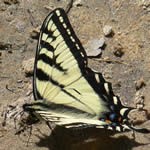
Identification and Biology of Butterflies
This workshop has been designed to educate participants about butterflies and how to identify them in the wild. Topics covered include, butterfly natural history, capture techniques, field identification, tagging, migration, and creating and maintaining butterfly habitat. The workshop concludes outside catching and identifying the butterflies of The Arboretum.
*Maximum 18 adults when held in person.
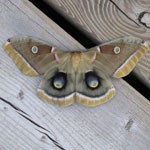
The Mysterious World of Moths
If you have ever wondered about the close cousins of butterflies, this introductory workshop will open your eyes to the amazing and mysterious world of moths. Participants are introduced to the "moth world" and what makes a moth so unique; learn about the families or groups of moths that you are most likely to encounter in the Guelph area; and how to find, identify, and appreciate moths. The workshop concludes with an outdoor explore in The Arboretum looking for roosting moths, day-flying moths, and moth caterpillars.
*Maximum 18 adults when held in person.
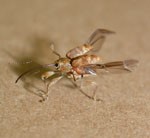
Ontario Insects
This workshop introduces participants to all the major groups of insects in Ontario with a focus on how to recognize major groups or families, with special reference to the common species one is likely to encounter in both the backyard and in the field. This is a great introductory course for educators, field researchers, and those who wish to simply become familiar with the mini-wildlife of Ontario.
*Maximum 18 adults when held in person.
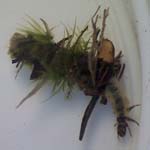
Pond Life
In this full-day program, participants will learn about the extraordinary biodiversity of ponds and learn the difference between the life in vernal (temporary) pools and permanent ponds. The workshop begins indoors with an overview of pond life and then moves outdoors for a hands-on opportunity to catch and identify organisms in a vernal pool and a permanent pond and discuss their unique ecologies. Participants receive a copy of the Pond Life Biodiversity Identification Sheet.
*Maximum 18 adults when held in person.
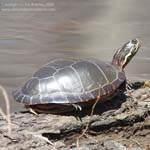
Reptiles
Reptiles are the most at-risk group of flora or fauna in Ontario. Due to their secretive nature, many of these amazing species, are largely unknown or overlooked by many outdoor enthusiasts. Every one of Ontario’s turtle species needs help and learning about these adorable creatures is an excellent way to assist them. Snakes are often misunderstood and maligned, but through this program we hope to change this by teaching the truth about these animals and providing opportunities to interact directly with some live specimens. Identification, ranges, and habits of our reptile species will be covered, and hands-on opportunities with some of our native snakes and turtles will make this an exciting experience.
*Maximum 18 adults when held in person.
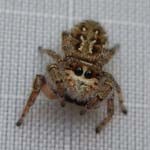
Hunters, Fishers and Trappers: The Amazing Life of Spiders
In this day-long workshop, participants learn about the fascinating life stories and identification tips about our most important invertebrate predators, the spider. Participants will venture outside for part of the day learning how to find and identify some of our amazing local arachno-fauna, discover first-hand why most insects are arachnophobic, and how we can (and should) help our local spider population.
*Maximum 18 adults when held in person.
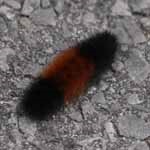
Winter Invertebrates: Cold and Spineless
In winter’s frigid grasp, insects, spiders and other invertebrates seem to vanish from the surface of the earth. Knowing what to look for and where to find these hidden creatures make cold-weather expeditions far more enjoyable. During this half-day program, participants search for goldenrod gallfly larvae and caterpillars that hide in burrs, learn how woolly bears forecast the severity of winter’s blast, and discover a great variety of other “bugs” that are surviving their most challenging season. Through photographs, hands-on bio-artifacts, and an outdoor exploration and discovery session participants become familiar with our cold and spineless neighbours. This workshop is held in winter, anticipate dressing to trek in cold and hopefully snowy conditions. A hand lens is recommended, but not required.
*Maximum 18 adults when held in person.
Plants and Mushrooms
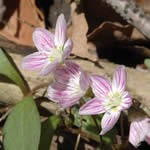
The Intriguing World of Spring Wildflowers
This is really two workshops in one. In addition to learning to identify Ontario's springtime flora, participants go "beyond the field guide" to delve into the natural history, ecology, lore, and uses of these plants. Following a brief classroom session, participants spend the remainder of the workshop engaged in hands-on exercises and stimulating discussions while exploring The Arboretum's nature preserves. Wildflower field guides and a hand lenses are recommended, but not necessary.
*Maximum 16 adults when held in person.

Winter Tree Identification
No leaves? No problem! From bark, to buds, to leaf scars, participants get hands-on experience in reading these winter clues for winter identification of deciduous trees. This workshop focuses on native Ontario trees, and part of the session is held outdoors, anticipate dressing for the weather.
*Maximum 16 adults when held in person.
Virtual Tree Identification

Instructor: Shelley Hunt
Do you love trees but can’t tell an Ash from a Walnut, a Birch from a Beech, or a Spruce from a Fir? Are you looking to connect more with the nature around you as we continue to stay close to home? Join Shelley Hunt, U of Guelph course instructor and former Arboretum Director, for a virtual, interactive tree identification workshop! Over the course of 4 Zoom sessions, with hands-on challenges to complete in between, you will learn the basics of tree ID, with a focus on native Ontario species (and their look-alike non-native counterparts). You will learn about the important features to look for (e.g. leaf shape and arrangement, bark characteristics, fruits and cones), as well as the details that help us to distinguish between species in the same group (e.g. Ashes, Pines, Maples). You will practice your skills on trees that you can (safely) find in your local area, and get feedback on your ‘homework’. The fourth session will include a virtual tour of trees in the Arboretum's collections. Sessions will run from noon-1:30 PM (one hour of instruction, and up to 30 minutes of optional questions/discussion) on Thursdays from July 8th through to July 29th.
Fee: $70 (plus HST) per person.
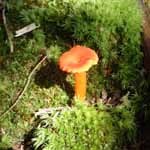
Mushrooms through Summer and Fall
Explore the mysterious, weird, and wonderful world of fungi! The course is open to participants of any skill level, with the assumption that most will be beginners. The program begins with a morning foray that is followed by an identification session and generation of a species list. Participants are encouraged to bring a field guide such as George Barron's Mushrooms of Ontario and Eastern Canada, as well as a digital camera.
*Maximum 16 participants when held in person.
Wellness
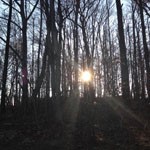
Ecopsychology
Participants will have the opportunity to engage in an 8-week program that explores the principles of Ecopsychology and Eco Art Therapy. Throughout this program, participants explore developing a deeper sense of self-value, their relationship with nature, and a desire to engage with nature as a trusted and valued aspect of life. This course will also explore Eco-Art activities that go beyond the barriers of artistic techniques and create pieces that they are truly proud of because of the deep experiences and meaning those pieces of art hold.
*Maximum 16 adults when held in person.
8 weeks, 6:30 - 8 PM
Ecopsychology is the area of study that explores the connective, holistic relationship of humans and the Earth. Amidst social distancing and physical isolation, the COVID-19 pandemic has invaded our lives in an unprecedented way. Experts have highlighted the complex toll this can take on our mental health. This programme is aimed at providing an experience where you will interact with an online community and share nature-based experiences to help bring hope, resilience, and positivity in your life right now. Participants will have the opportunity to engage in this 8-week course that explores hands-on components of Ecopsychology as well as some elements of Eco-Art Therapy. Participants will be introduced to some key concepts of Ecopsychology and then participate in some reflective and nature-connective activities. This course is completely conducive to all levels of social distancing and isolation.
Memona Hossain is a mother and wife. She is currently pursuing her PhD with Project Nature Connect. Memona has also completed her Master’s in Education at the University of Toronto. Memona is working to complete her certification in Art Therapy. Memona has been working in the field of Mental Health, Addictions, and Developmental Disabilities for over 15 years. Memona has taught Ecopsychology at the University of Guelph Arboretum and Riverwood Conservancy. Memona is involved in Eco-diverse conversations, engaging with individuals and groups of diverse background as it pertains to climate action. Memona is currently involved in a global research project exploring women from around the world and their connection to the Earth and environmental activism.
Fee: $120 (plus HST) per person.
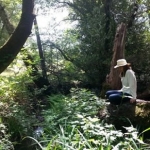
Shinrin - Yoku Walk
Inspired by Shinrin-Yoku, a Japanese term that translates into “Forest Bathing” in English, discover a gentle way of moving mindfully through nature. Led by a guide from the Canadian Chapter of the Association of Nature and Forest Therapy Guides, participants experience a walk intended to open the senses, deepen a connection with the natural world, and enhance wellbeing.
*Maximum 20 adults when held in person.
Seeing the Forest for the Trees: Trees as Participants in Theatre and Performance

Tuesday, October 19, 12 - 1 PM
Format: Online via Zoom
Presenter: Dr. Megan De Roover, Writer-in-Residence
Join us for a free public talk by Megan De Roover, Writer-in-Residence affiliated with The Arboretum this year! She is conducting archival and on-site research for her new book Seeing the Forest for the Trees: Trees as Participants in Theatre and Performance (McGill-Queen's University Press). Using a theatre and performance lens, her research monograph explores the relations we already have with trees - in lived and mediated encounters - and how we can aim to build better ones. Readers will be pushed to reconsider the ubiquitous yet overlooked tree, and thereby the nonhuman world more generally, through new theoretical frameworks.
